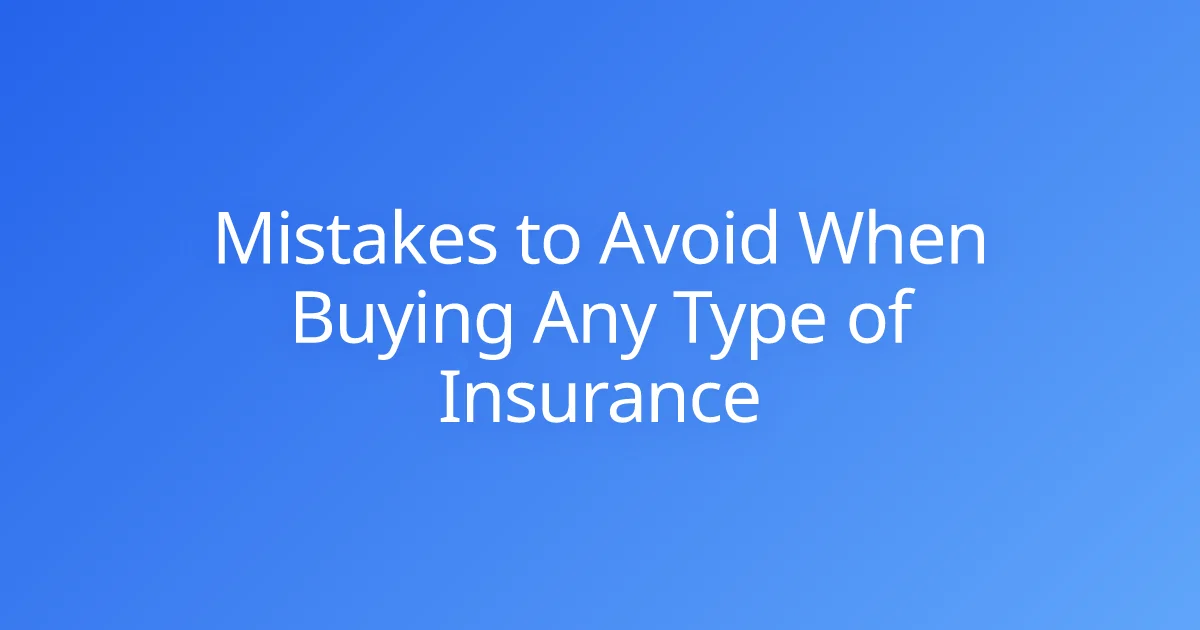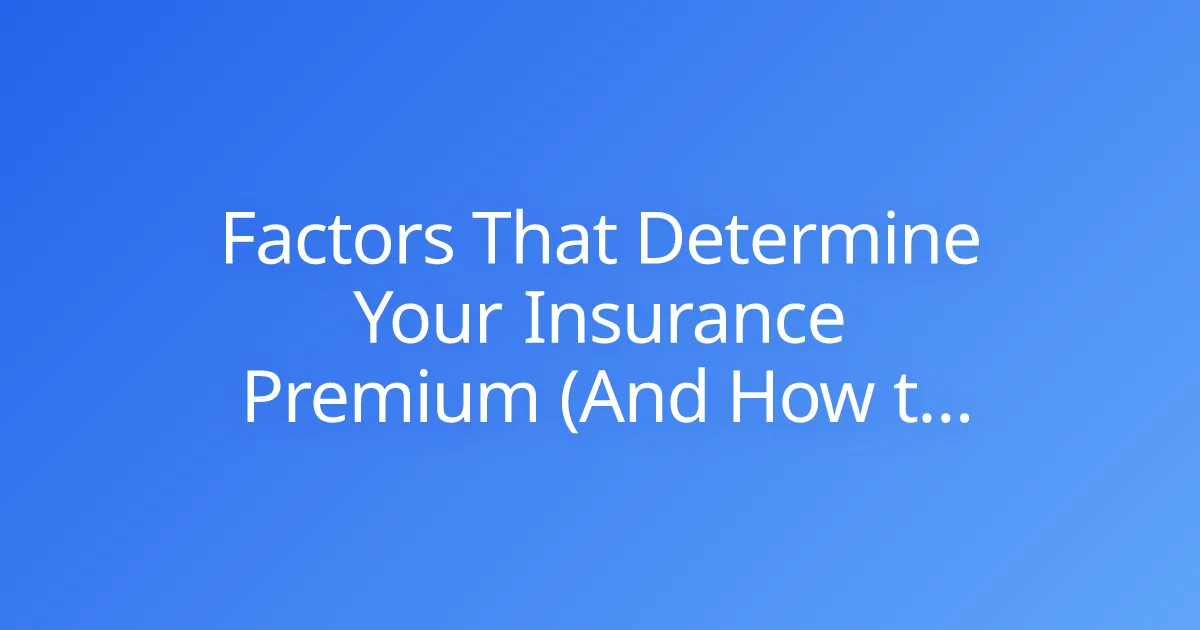Mistakes to Avoid When Buying Any Type of Insurance
Are you about to purchase a new insurance policy, or perhaps review an existing one? The world of insurance can be complex, and it’s all too easy to fall into common traps that can leave you either dangerously underinsured when you need protection most, or unnecessarily overpaying for coverage you don't fully understand. Many people approach insurance as a chore, simply looking for the cheapest option or sticking with their current provider without question. This passive approach leads to significant financial pitfalls.
At The Policy Explainer, we believe that informed decisions are the best defense against unexpected costs. This comprehensive guide will illuminate the most critical mistakes to avoid when buying any type of insurance, whether it's for your car, home, health, or life. We’ll expose the common missteps, explain their potential consequences, and, most importantly, provide you with actionable strategies to buy insurance wisely, secure optimal coverage, and ultimately save money.
Why Avoiding Insurance Buying Mistakes is Crucial
The consequences of making errors when purchasing insurance can range from minor annoyances to catastrophic financial ruin. Understanding these risks highlights the importance of a thoughtful approach.
The Peril of Being Underinsured
This is perhaps the most dangerous mistake. If you haven't bought enough coverage, a major event (a serious car accident, a house fire, a severe illness) could leave you personally responsible for hundreds of thousands, or even millions, of dollars beyond what your policy pays out. Your life savings, assets, and future earnings could be at risk. Being underinsured means your insurance policy, while seemingly protecting you, won't cover your true financial exposure.
The Burden of Overpaying
On the flip side, many people end up paying too much for insurance. This might be due to having redundant coverage, unnecessary riders, or simply not exploring all available discounts and providers. While less catastrophic than being underinsured, consistently overpaying for insurance drains your budget needlessly, funds that could be better used for savings, investments, or other financial goals.
Stressful and Denied Claims
Mistakes made during the purchasing process can surface years later during a stressful claims situation. Inaccurate information provided, misunderstood exclusions, or incorrect coverage choices can all lead to delays, disputes, or even outright denials of your claim, adding immense frustration to an already difficult time.
Common Mistakes to Avoid Before You Buy
The preparation phase is critical. Many errors are made even before you begin comparing quotes.
1. Not Assessing Your True Needs
Many people buy generic insurance plans without thinking about their unique circumstances.
- The Mistake: Assuming a standard policy is "good enough" without considering the actual value of your assets, your lifestyle, your family's needs, or your potential liabilities. For example, buying only state-minimum auto liability coverage when you own significant assets.
- The Impact: You might be underinsured for a major loss, meaning your policy limits won't cover the full cost of damages or a lawsuit, leaving your personal assets vulnerable. You could also be overpaying for unnecessary coverage if your needs have changed (e.g., insuring a car for collision that's only worth a few thousand dollars).
- How to Avoid: Take inventory of your assets (home value, car value, valuable possessions), assess your lifestyle (commute, health status, travel frequency), and consider your dependents. What's the worst-case scenario you want to protect against? This dictates your necessary coverage limits and types.
2. Focusing Only on Price
While cost is a factor, making premium the sole deciding factor is a common pitfall.
- The Mistake: Choosing the cheapest available quote without comparing coverage limits, deductibles, exclusions, or the insurer's reputation.
- The Impact: A low premium often means lower coverage, higher deductibles, or significant exclusions that could leave you exposed. You might save a few dollars monthly but face tens of thousands in unexpected costs later.
- How to Avoid: Always compare "apples-to-apples." Get quotes with identical coverage limits, deductibles, and endorsements. Then, evaluate the overall value, considering service reputation and financial stability, not just the lowest number.
3. Not Understanding Policy Basics
Insurance policies are complex, but understanding key terms is essential.
- The Mistake: Signing a contract without understanding terms like "deductible," "premium," "coverage limits," "exclusions," "coinsurance," or "actual cash value vs. replacement cost."
- The Impact: You might miscalculate your out-of-pocket costs, incorrectly assume coverage, or be unaware of what's excluded, leading to a denied claim or unexpected financial burden.
- How to Avoid: Read your policy's declarations page, definitions section, and exclusions thoroughly. Don't hesitate to ask your agent or insurer to explain any term you don't understand in plain language.
4. Omitting or Misrepresenting Information
Providing inaccurate details, even unintentionally, can have severe repercussions.
- The Mistake: Failing to disclose an accident, a new driver in the household, a past claim, or making false statements about your property (e.g., roof age, home business activities) to get a lower quote.
- The Impact: This is a serious breach of contract. Insurers can deny claims, cancel your policy retroactively (as if it never existed), or even pursue legal action for fraud.
- How to Avoid: Always be honest and thorough when providing information for a quote or application. It’s far better to pay a slightly higher, accurate premium than to risk losing all coverage when you need it most.
Mistakes During the Purchase Process
Even once you've done your homework, errors can occur during the actual selection and purchase.
5. Only Getting One or Two Quotes
Limiting your options severely restricts your ability to find the best deal.
- The Mistake: Accepting the first quote you receive or only checking with your existing provider out of convenience.
- The Impact: Insurance rates vary widely between companies. You could be missing out on significant savings or better coverage options that another insurer offers.
- How to Avoid: Always get multiple quotes – aim for at least 3-5 – from various sources: direct insurers, captive agents (who work for one company), and independent agents (who can shop multiple carriers for you).
6. Ignoring Insurer Reputation and Customer Service
A low price is meaningless if the company is unreliable during a claim.
- The Mistake: Prioritizing cost over the insurer's financial stability or their track record for claims handling and customer satisfaction.
- The Impact: You could face frustrating delays, difficult claim adjusters, or even a company that struggles financially when you need them to pay out.
- How to Avoid: Research the insurer's financial ratings (A.M. Best, S&P), read customer reviews, and check consumer complaint ratios with your state's Department of Insurance. Choose a financially strong company with a solid reputation for service.
7. Overlooking Discounts and Bundles
Many policyholders miss out on easy savings.
- The Mistake: Not asking about all available discounts or assuming bundling is always the best option.
- The Impact: You might be paying more than you need to. While bundling (e.g., home and auto with the same insurer) often saves money, it's not universally the case.
- How to Avoid: Explicitly ask about every discount you might qualify for (multi-policy, safe driver, good student, home safety features, paying in full, paperless billing, etc.). When considering a bundle, also get separate quotes for each policy to compare.
8. Rushing the Decision
Impulsive insurance purchases often lead to regrets.
- The Mistake: Waiting until the last minute to shop for insurance, forcing a quick decision without proper comparison.
- The Impact: You might overlook better offers, misunderstand policy details, or make hasty choices that don't align with your needs.
- How to Avoid: Start shopping for insurance at least a few weeks before your current policy expires or before you need new coverage (e.g., before closing on a house or buying a new car). This gives you ample time for research and comparison.
Post-Purchase Pitfalls
The process doesn't end once you've bought the policy. Ongoing management is key.
9. Not Reviewing Your Policy Annually
Your insurance needs change as your life evolves.
- The Mistake: Letting your policy auto-renew year after year without reviewing its terms or assessing if it still meets your current needs.
- The Impact: Your coverage could become outdated, leaving you underinsured (e.g., after a home renovation) or you might be paying too much (e.g., a car's value has depreciated).
- How to Avoid: Schedule an annual insurance review with your agent or independently. Check your declarations page, confirm coverage limits, deductibles, and ask about new discounts.
10. Failing to Update Your Policy After Life Changes
Significant life events directly impact your insurance requirements.
- The Mistake: Not informing your insurer about major life changes like getting married, having a child, adding a new driver, starting a home business, or making significant home renovations.
- The Impact: These changes can alter your risk profile. Failing to update could lead to a denied claim, policy cancellation, or inadequate coverage for your new circumstances.
- How to Avoid: Treat every major life event as a trigger to contact your insurer. Proactively update them on changes to your family, assets, or property use.
How to Buy Insurance Smarter (A Pro's Checklist)
To ensure you avoid these common pitfalls and buy insurance wisely, consider this checklist:
- Assess Your Needs: What do you really need to protect?
- Gather Info: Have all necessary personal and asset details ready.
- Get Multiple Quotes: Shop around from various reputable insurers.
- Compare "Apples-to-Apples": Match coverage limits, deductibles, and types.
- Research Reputation: Check financial strength and customer service reviews.
- Look for Discounts: Ask about all eligible savings.
- Read the Fine Print: Understand definitions and exclusions.
- Be Honest: Provide accurate information.
- Review Annually: Make policy reviews a regular habit.
- Update Promptly: Inform your insurer about significant life changes.
Conclusion
Buying any type of insurance is a significant financial decision that deserves careful attention. By understanding and actively avoiding these common mistakes, you transform yourself from a passive consumer into an empowered policyholder. This proactive approach ensures you secure coverage that genuinely protects your financial future, optimizes your premiums, and provides invaluable peace of mind. Don't let oversight or convenience lead to costly regrets. Take control of your insurance choices. Do you have any specific concerns about a mistake you might be making, or perhaps a challenging scenario you're navigating with your insurance purchase?



